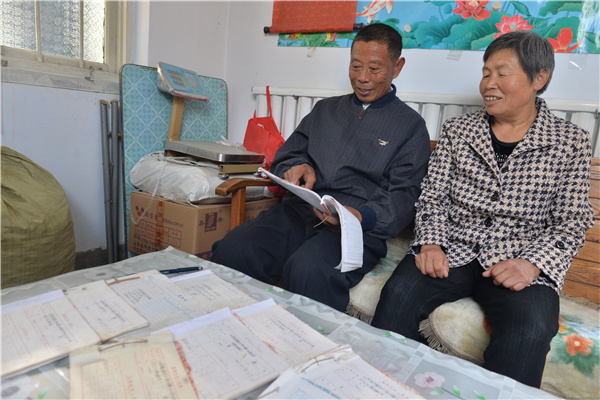Farmer's accounts offer insight into social change
 |
|
Liu Yuanjiu checks one of his handwritten account books with his wife at their home in Pingdu, Shandong province. [Xing Zhifeng/For China Daily] |
A farmer's daily handwritten account books, recording his family's earnings and expenditure on agricultural production and life during the past decade, have been added to the National Museum of China's collection.
It is the second time the museum has shown an interest in this farmer's books. An earlier set of records dating back 35 years were included in the museum's collection 10 years ago.
Liu Yuanjiu, a 65-year-old farmer in Pingdu, Shandong province, started writing down his family's income and expenses every day after his marriage in 1982, ranging from buying daily necessities, such as cooking oil and salt, to purchasing a house or a car.
Over the years he has accumulated 35 books filled with neat digits and words. Liu said at first he just intended to keep track of his spending and avoid extravagance and waste.
During a meeting last month, Liu, who is a member of the Communist Party of China, told his fellow villagers that "my family's earnings are no secret".
In 2013, his family income was 45,426 yuan ($6,860) and expenditure was 26,020 yuan, leaving 19,406 yuan.
In 2016, their income increased to 95,645 yuan and the expenditure to 42,448 yuan, leaving 53,197 yuan, almost double what it was three years ago, according to Liu.
He said the lives of his family members have improved thanks to the Party's favorable policies for farmers.
"The report of the 19th CPC National Congress put forward a strategy for rejuvenating rural areas, and prioritized the development of agriculture and the countryside," Liu said.
"The CPC Central Committee is concerned about agriculture, the countryside and farmers' livelihoods.
"As long as farmers roll up their sleeves and work harder, our lives will become more prosperous."
Liu's family lives near Daze Mountain in Pingdu, an area known for its grapes, which enjoy a good reputation and sell well.
Liu's family income mainly comes from cultivating the fruit.
In addition, he and his wife receive annual pension of nearly 6,000 yuan, as they are older than 60 years.
"Our earnings are average for our village, so we are not a burden to our son, who is living in a big city," Liu said, adding that he even gave his son 180,000 yuan to buy two houses.
Liu is looking forward to developments in the village next year.
"A new road outside the village, which will boost local tourism, will open to traffic next year, while construction of a new office building has also started," he said.
Zhang Yu, an official from the National Museum of China, told Liu's family that the museum will collect their accounts as long as they continue to keep records.
"An ordinary farmer's private accounts seem to be a trivial matter, but they reflect China's economic and social progress in recent years, especially changes in farmers' lives," Zhang said.


























